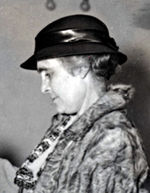Virginia E. Jenckes, Date of Birth, Place of Birth, Date of Death
TweetVirginia E. Jenckes
American politician
 Date of Birth: 06-Nov-1877
Date of Birth: 06-Nov-1877
 Place of Birth: Terre Haute, Indiana, United States
Place of Birth: Terre Haute, Indiana, United States
Date of Death: 09-Jan-1975
Profession: politician
Nationality: United States
Zodiac Sign: Scorpio 
About Virginia E. Jenckes
- Virginia Ellis Jenckes (November 6, 1877 – January 9, 1975) was the first woman from Indiana to be elected to the U.S.
- House of Representatives.
- The Terre Haute, Indiana, native served three terms as a U.S.
- Representative (March 4, 1933 – January 3, 1939) from Indiana's Sixth Congressional District.
- In 1937 she became the first American woman appointed as a U.S.
- delegate to the Inter-Parliamentary Union in Paris, France.
- The outspoken, independent-minded farmer from Vigo County was an advocate for women and became known for her support of flood-control measures and repeal of Prohibition, as well as her opposition to communism.
- Jenckes's most significant accomplishment for her Indiana constituents was obtaining an $18 million appropriation for the Wabash River basin that eventually became law. While Jenckes broadly supported New Deal initiatives in general and voted with the majority of the Democrats in the U.S.
- Congress, she did not always follow the Democratic majority.
- During her later years, Jenckes became especially concerned about thwarting what she believed to be communist propaganda and its perceived threats, despite the public ridicule she received.
- After retiring from Congress in 1939, Jenckes served as an American Red Cross volunteer for more than twenty years.
- During the Hungarian uprising of 1956, she gained national attention for her efforts to assist five Catholic priests in their escape to the United States from Hungarian prisons.
- In 1969 Jenckes returned to Indiana, where she spent the final years of her life.
Read more at Wikipedia

